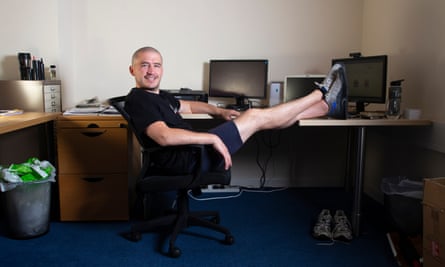Until 2020, I lived by five-year plans. I had set my career track when I was still a child, racing through school to get to university, then university to get to work. I was often described as “driven” – approvingly by teachers and bosses, and pejoratively by ex-boyfriends, who perhaps felt they had got the raw end of the deal.
When I was 28 years old, I started seeing a therapist to find out how to work more and better. She and I discussed my career more than we did my childhood, or my mental health, or my love life. I didn’t want a partner, I told her, because they would just be a distraction.
She might have challenged me had I not stopped seeing her because of the pandemic. By then I had been freelance for six months. Through lockdown, I worked all day, most days, and several nights through to dawn. At first there was a perverse solace to this: I was still making progress, even though I was stuck in one place. Then, one September morning after yet another all-nighter, I came to a sudden, painful stop.
My burnout was especially distressing for being self-inflicted; I felt bewildered and betrayed, as if my trusty north star had led me astray. Gingerly, I started interrogating my ambition: what was I seeking from work, and where might this feeling be better sourced?
By my 30th birthday, in March 2021, the version of myself who had organised her entire life around her career felt like a stranger. I was still productive, but no longer at the expense of my health, happiness or relationships. It was as if the fire that had been fuelling me for half my life was down to a smoulder – and for the first time, I was content to let it go out.
It turns out I was not alone. This has been called the age of anti-ambition: over the past two and a half years, many people have taken stock – of how they spend their time, where they find meaning, their hopes for the future – and found work wanting.
Hundreds of thousands have quit their jobs, most to take early retirement or live off savings, shrinking the UK labour force by an estimated 1 million workers. In the US, 2.8% of employed people resigned in May alone (although that is balanced against “hires” of 4.3%) – only just down from the peak of 3% last year. Those who can’t afford to opt out of work altogether, meanwhile, are less invested in it. In one survey, 37% of respondents said their job had become less important to them through the pandemic, with many citing burnout or a change in values.
In pop culture too, this shift is evident. In just two years we’ve gone from celebrating “hustle culture” to a backlash ensuing after Kim Kardashian dared to declare that “nobody wants to work these days”. Even Beyoncé – a self-professed workaholic, who has spoken of going without food, sleep and bodily relief so she can “slay all day” – is now singing on Break My Soul about quitting her job and building “a new foundation” around love, fun and rest.
For some of us, this amounts to a new identity. “I don’t have the titles, benefits package or authority I maybe once had,” Rob Weatherhead tells me, “but there is no money in the world you could offer me to go back to chasing them.”
 View image in fullscreen‘For me it’s about looking forward: in 20 years’ time, will I be happy about the decisions I’ve made?’ … Rob Weatherhead in his work office, a few minutes from his home. Photograph: Richard Saker/The Guardian
View image in fullscreen‘For me it’s about looking forward: in 20 years’ time, will I be happy about the decisions I’ve made?’ … Rob Weatherhead in his work office, a few minutes from his home. Photograph: Richard Saker/The Guardian
For nearly half his life Weatherhead, 40, was climbing the ranks in advertising, all the way to director level. That meant long days, regular travel to Manchester and London from his home in Bolton, and extended periods away from his three young children.
At the time, he accepted this as the price of his ambition. “It was always about the next thing, whether it was a promotion or another opportunity,” he says. “It’s difficult to see beyond that when you’re in that world.”
What people want less of now is pointless presenteeism, stress, toxic workplaces and the commute Julia Hobsbawm
Weatherhead remembers leaving the London office late, in the lead-up to a big pitch, to find about 20 others still at work too. “They probably had commitments, children, partners,” he says in disbelief. “I was just like: what are you doing here at 11 o’clock at night?”
In an attempt to control his time, in 2014 Weatherhead left his job to become a freelance consultant. But he remained at the beck and call of his clients. “I was still chasing … well, whatever it was I was chasing.” He sounds genuinely at a loss. “Probably progression, in some form.”
It took the pandemic, and losing all his contracts for eight weeks, for him to recalibrate. He now works three minutes’ walk from his house, does the school run each morning and is learning jujitsu alongside his children, aged 10, eight and five. The younger two, he notes with obvious pride, won’t remember a time when he wasn’t there for them.
He has also set up a wine business with a friend. “But it’s just something that we enjoy doing.” His past life now strikes him as bizarre. “For me – without sounding grandiose – it’s about looking forward: in 20 years’ time, will I be happy about the decisions I’ve made? Will I still have good strong bonds with my children?”
Research by the Families and Work Institute in the US suggests that most people stop jostling for promotion at 35 years old, often coinciding with childcare responsibilities. But the recalibration we’re seeing now is more than this inevitable, individual drift – it appears to be a cultural U-turn.
Julia Hobsbawm, a consultant and author of The Nowhere Office, calls it the “great reevaluation”: a large-scale reckoning that will shape the future of work. “It isn’t so much that people have less ambition, but that their ambition is changing – from being about career success first, to work-life balance,” she says.
Dissatisfaction with modern work – rigid hierarchies, bad management, boundaries that flex only one way – had been mounting for decades, says Hobsbawm. The upheaval of 2020 not only revealed our jobs to be more flexible than many of us had been led to believe; we were also reminded of the importance of health, hobbies and relationships – our careers often seeming hollow by comparison. Now, says Hobsbawm, “there’s a widespread sense of ‘carpe diem’”.
“No one can just go back as before, because we are all in some way profoundly changed,” she says. “What people want less of now is pointless presenteeism, stress, toxic workplaces and the commute … People want autonomy and flexibility as much as they want promotion and professional careers, or more.”
For those high up on the corporate ladder, however, it can be a dizzying climbdown.
Katie Mantwa George, 38, spent 15 years working in recruitment for companies including Barclays, Credit Suisse, Rothschild and AIG. “It was fun,” she tells me. She enjoyed the travel, the camaraderie – even the pressure. “I was always fishing for the next promotion, really wanting to prove myself.”
George had good boundaries, creative outlets and strong relationships; but when I ask if she ever burnt out, she is unequivocal. “Oh, definitely.” She felt the burden of representation too. “Being one of the only women of colour in leadership at most of the companies I worked, it quite often fell to me to have a say – and it’s draining, to be honest. I want to make a difference, but it’s extra work.”
 View image in fullscreen‘I got to the point where I couldn’t sleep – my heart was in overdrive’ … Katie Mantwa George
View image in fullscreen‘I got to the point where I couldn’t sleep – my heart was in overdrive’ … Katie Mantwa George
By 2020 George was working at Amazon, leading a team of nearly 40 people across 12 cities, and had well and truly eclipsed the financial instability that she had weathered growing up. “It made me feel like I’d made it,” she says.
But the corporate world was starting to take a toll. “I got to the point where I couldn’t sleep – my heart was in overdrive,” George says. She went to see her doctor, who told her she was overworked and gave her a heart rate monitor to wear for three days.
This health scare prompted a life overhaul: she enlisted a coach, relocated with her job to Cape Town to be close to family, and later took a three-month unpaid sabbatical. When it came time to return to the office, Katie’s team had evolved and she realised that she had too.
She quit last August, and has since pursued work that feels meaningful: she has written a children’s book about being mixed race, advised on inclusive recruiting strategy, coached corporate types in empathic leadership, and taught meditation – “to slow everyone else down too”.
It has not been easy to turn down opportunities or to adjust to the step-down in status and income. “But I feel so much more me.” She doesn’t start work before 10am or carry on past 5pm, does yoga daily and spends quality time with family. “Ambition used to mean a bigger paycheck, a bigger brand, a more senior position … Now I’d actually rather go and watch the sunset.”
Ben Franklin, the director of the Centre for Progressive Policy, sees this daily. “Across many sectors, people are wanting to work flexibly, and employers are struggling to meet that demand,” he says. To Hobsbawm, the resistance to returning to the office, despite government exhortations, is also revealing. “Managers who try to insist on presenteeism, from Elon Musk to Jacob Rees-Mogg, look anachronistic,” she says. “Workers are voting with their feet.”
The transition to hybrid working could see inequality worsen, however, Hobsbawm warns, with only in-demand talent able to dictate their terms. But there is one powerful force hastening the end of ambition and the beginning of a new era of work: gen Z.
“Speaking of ambition,” says Maeve cheerily, when I call her at noon, “I’ve just woken up.” The 19-year-old is back home in Saffron Walden, Essex, from Bristol University, where she is studying languages.
Unlike older millennials such as myself – who may have had a rosy view of work before being disappointed – “zoomers” have only ever known stagnant wages, insecure contracts, sudden redundancies and crushing student debt.
Factor in the pandemic, the Ukraine war and the climate crisis, “and you almost believe ambition could be to your detriment, because there are so many things working against you”, says Maeve. “The world seems incredibly fickle – there’s this sense of: ‘I’ll just get there when I get there.’”
Maeve is passionate and principled: she doesn’t eat meat, buy new clothes or use social media, and says she “can’t get enough” of learning about the world. Had she been born 10 years earlier, Maeve might have grown up a five-year planner like me. “I really value my degree; I’ve always worked hard,” she says. “But to plan some huge structure of what you’re going to do … you just feel that it’s likely to crumble underneath you.”
It’s sad, Maeve agrees, but no surprise. Maeve has had jobs since she was 13, but worries that she will never earn enough. “A hardback book is 20 quid, a pint is a fiver – so many pleasures in life are so expensive.”
Many gen Z-ers are well versed in anti-capitalist theory and broadcast their apathy, ambivalence or anger on social media. “I don’t want to hustle,” said a twentysomething TikTokker last year. “I simply want to live my life slowly, lay down in a bed of moss with my lover, and enjoy the rest of my existence.”
Many of gen Z feel the same. In Deloitte’s recent survey of more than 23,000 workers aged 18 to 38, work-life balance was found to be their top priority when choosing an employer, and 75% preferred remote or hybrid patterns.
I just moved to a four-day week, without losing any pay. It’s changed everything | Jill TichborneRead more
It reflects what I’ve found myself repeating in conversation over the past year: that the goals that used to spur me on now matter less than leading “a nice life”. That has meant revising my ambition, from becoming a bestselling author by 32 (“at the latest!”) to recapturing my love for writing.
Maeve also gained clarity. During lockdown she was studying for her A-levels. “I don’t think I’ve ever worked so hard in my life. I didn’t see anyone. I felt terrible,” she says. But she also altered clothes for friends, spent hours playing violin and read one novel a week.
“The only way that I could keep my ambitions was to scale them down,” Maeve says. Now, she has just the one: “this huge, huge, almost indignant desire” – to be happy.
“There’s lots of things that people my age are going to have to struggle through and settle for, but that’s something that I feel like I can do for myself,” Maeve says. “People think happiness is a privilege, or a byproduct of success – but it can also be a goal.”





Leave a Reply
You must be logged in to post a comment.